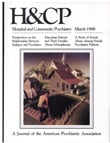Prevalence of a History of Sexual Abuse Among Female Psychiatric Patients in a State Hospital System
Abstract
Fifty-one percent of a sample of 105 female state hospital patients were found to have been sexually abused as children or adolescents. In the majority of cases, hospital staff were unaware that the patients had histories of sexual abuse, and only 20 percent of the abused patients believed they had been adequately treated for sexual abuse. Sixty-six percent of the abused patients met the diagnostic criteria for posttraumatic stress disorder, although none had received that diagnosis. Compared with patients who had not been sexually abused, abused patients were significantly more likely to have 17 of 32 symptoms commonly linked with sexual abuse. Every patient who was positive for six symptoms—compulsive sexual behavior, chemical dependency, sadomasochistic sexual fantasy, sexual identity issues, chronic fatigue, and loss of interest in sex—had been sexually abused.
Access content
To read the fulltext, please use one of the options below to sign in or purchase access.- Personal login
- Institutional Login
- Sign in via OpenAthens
- Register for access
-
Please login/register if you wish to pair your device and check access availability.
Not a subscriber?
PsychiatryOnline subscription options offer access to the DSM-5 library, books, journals, CME, and patient resources. This all-in-one virtual library provides psychiatrists and mental health professionals with key resources for diagnosis, treatment, research, and professional development.
Need more help? PsychiatryOnline Customer Service may be reached by emailing [email protected] or by calling 800-368-5777 (in the U.S.) or 703-907-7322 (outside the U.S.).



